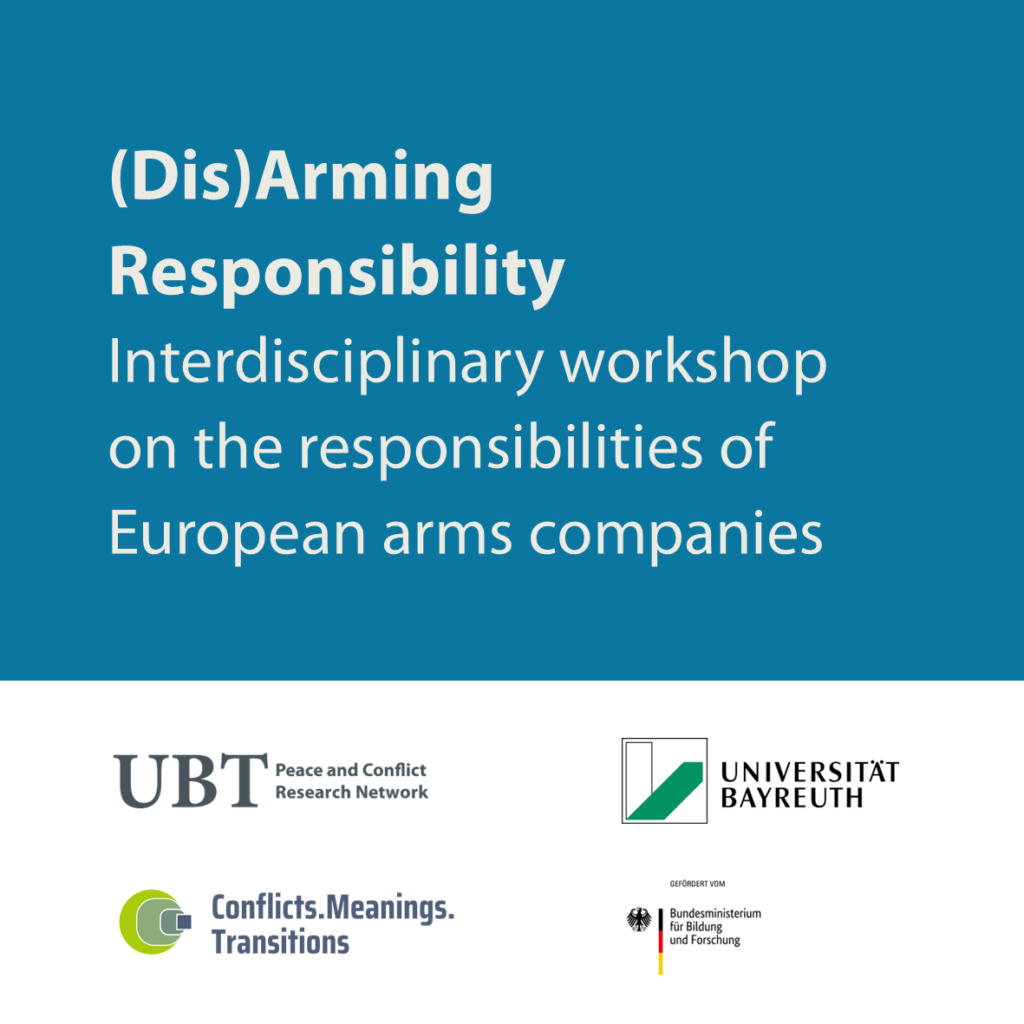(Dis)Arming Responsibility – An interdisciplinary workshop

Oktober 25 – 26, 2024 The workshop brings together an interdisciplinary team of European scholars, practitioners, and activists engaged in studying international arms production and transfer, with a particular focus on European arms companies. While there has been significant scholarly attention devoted to the responsibilities of states in managing the trade in arms, much less […]
Keynote Opening Panel: ‚Queer, Feminist, and Relational Perspectives on Time and Temporality‘
Speakers: Emma Pritchard, University of Oxford; Alvaro Okura, State University of Londrina (UEL/Brazil); Juliana González Villamizar, Giessen University Moderated by Prof. Susanne Buckley-Zistel Postcolonial Hierarchies in Peace & Conflict Network and one of its member-institutions, Center for Conflict Studies at Philipps University Marburg, is hosting an Opening Panel on ‚Queer, Feminist, and Relational Perspectives on Time and Temporality.‘ The […]
Public Lecture by Prof. Manuela Boatcă, „We Have Never Been Postcolonial. Notes on Theoretically (In)Convenient Times“
With an introduction by Prof. Annika Oettler and Prof. Susanne Buckley-Zistel. Postcolonial Hierarchies in Peace & Conflict Network and one of its member-institutions, Center for Conflict Studies at Philipps University Marburg is hosting a Public Lecture by Prof. Manuela Boatcă, „We Have Never Been Postcolonial. Notes on Theoretically (In)Convenient Times.“ The event is held as part of the […]
Handbook on Peace and Conflict Studies: Perspectives from the Global South
Peace and Conflict Studies was broadly founded in the Northern Hemisphere, influencing how scholars understand patterns of peace or violence in the Global North via a core-periphery relationship with the Global South, automatically rejecting alternatives like Third Worldism. This has led to the implicit strengthening of asymmetric colonial power structures in the way knowledge about […]
TEMPORALITIES OF RUPTURE AND CONTINUITY
TEMPORALITIES OF RUPTURE AND CONTINUITY October, 16-17 2024 Marburg After exchanging and engaging with each other’s work for our 4th Think Lab held in Frankfurt, we continue to explore themes and concepts under the umbrella of PostColonial Hiearchies in Peace and Conflict. This time we will be convening to discuss a theme of temporality and […]
Roundtable “Coloniality in the City“
The edited video recording will be available in due course.
The Bodies that don’t Count: Understanding the Coloniality of Violence in our Times
In a far from perfect world full of suffering and violence, our theoretical and conceptual understandings need to be constantly reinvented, to remain both relevant and responsive to the challenges of the times. The pandemic and the last few years of unpredictability in global politics have demonstrated the inadequacies of the existing understandings of violence, […]
TAKING STOCK AND MOVING FORWARD, REFLECTING ON ONGOING RESEARCH WITHIN THE NETWORK – ACTORS, ONTOLOGIES, AND STRATEGIES (18. APRIL 2024)
TAKING STOCK AND MOVING FORWARD, REFLECTING ON ONGOING RESEARCH WITHIN THE NETWORK – ACTORS, ONTOLOGIES, AND STRATEGIES April 18, 2024 10:30 am Frankfurt am Main
Genealogies of African Studies in Germany: An intersectional critique and ways forward
https://youtu.be/0tlGXJrC5NYOf late, there is a lot of discomfort, irritation and unease in African Studies, incidentally just when it opens itself up to the business of Diversity, Inclusion, and Equity (DIE). This affective state seems to mirror the overall ethos within academia in the North Atlantic that the African American intellectual Hortense Spiller describes as being […]
Rethinking the coloniality and violence of famines in the Global South [video]
“I am interested in the methodological and conceptual (un)doing of violence, in the study of famines or hunger deaths from a postcolonial perspective” Swati Parashar About this lecture: Postcolonial scholars contend that we are still doing body counts of colonialism’s violence, hence, epistemic and discursive categories may not account for the materiality of violence and […]
